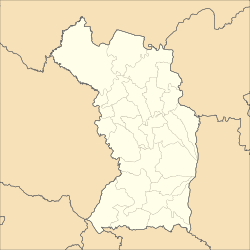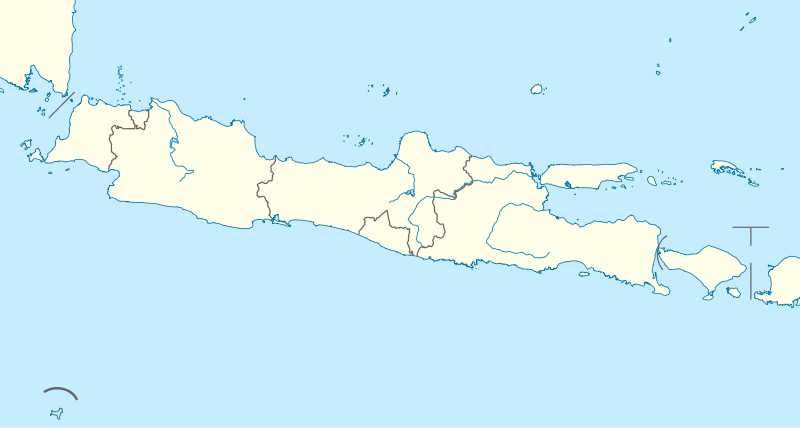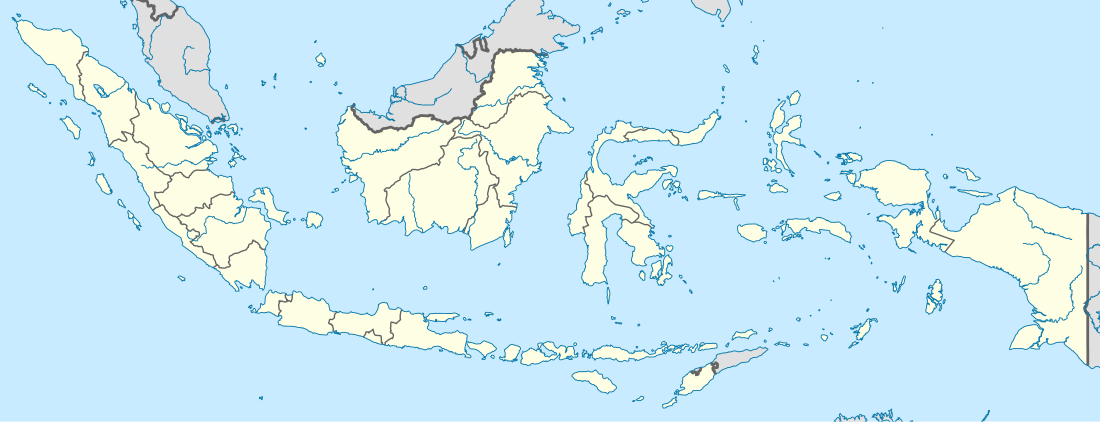Majalengka
Majalengka (Sundanese: ᮙᮏᮜᮦᮀᮊ) is a Town and district in the West Java province of Indonesia; it is the capital of Majalengka Regency. At the 2010 Census, the district had a population of 68,871, of which the town (comprising the communities of Majalengka Wetan and Majalengka Kulon) had a population of 20,906. In 20 Km from the city of Majalengka, specifically in Rajaguluh (one of the villages in Majalengka), there is a traditional food called "pedesan bebek" which tastes very good and a little bit spicy.
Majalengka | |
|---|---|
| Other transcription(s) | |
| • Sundanese | ᮙᮏᮜᮦᮀᮊ |
Munjul Roundabout | |
 Majalengka  Majalengka Majalengka (Java)  Majalengka Majalengka (Indonesia) | |
| Coordinates: 6.836452°S 108.227278°E | |
| Country | |
| Province | West Java |
| Regency | Majalengka Regency |
| Government | |
| • Camat | Hendra Krisniawan |
| • Secretary | Soetaryo |
| Area | |
| • Total | 57.07 km2 (22.03 sq mi) |
| Elevation | 141 m (463 ft) |
| Population (2018)[1] | |
| • Total | 71,405 |
| • Density | 1,300/km2 (3,200/sq mi) |
| Time zone | UTC+7 (IWST) |
| Area code | (+62) 233 |
| Villages | 14 |
Administrative divisions
Majalengka consists of 14 villages (Kelurahan or Desa) which are as follows:[1]
- Babakan Jawa
- Cibodas
- Cicurug
- Cijati
- Cikasarung
- Kawunggirang
- Kulur
- Majalengka Kulon
- Majalengka Wetan
- Munjul
- Sidamukti
- Sindangkasi
- Tarikolot
- Tonjong
Toll Road Access
| KM | Toll Road | Toll Gate | Destination |
|---|---|---|---|
| 159 | Cikopo-Palimanan Toll Road | Kertajati | Kertajati Majalengka Sumedang |
Education
Here is the list of colleges in Majalengka:
Public institutions:
Private institutions:
gollark: > A core proposition in economics is that voluntary exchanges benefit both parties. We show that people often deny the mutually beneficial nature of exchange, instead espousing the belief that one or both parties fail to benefit from the exchange. Across 4 studies (and 7 further studies in the Supplementary Materials), participants read about simple exchanges of goods and services, judging whether each party to the transaction was better off or worse off afterwards. These studies revealed that win–win denial is pervasive, with buyers consistently seen as less likely to benefit from transactions than sellers. Several potential psychological mechanisms underlying win–win denial are considered, with the most important influences being mercantilist theories of value (confusing wealth for money) and naïve realism (failing to observe that people do not arbitrarily enter exchanges). We argue that these results have widespread implications for politics and society.
gollark: (linking because I happened to read it recently)
gollark: But look at this: https://psyarxiv.com/efs5y/
gollark: I mean, *maybe* some behaviors make sense at population scale or in some bizarre game-theoretic way?
gollark: No, humans just act irrationally all the time for no good reason.
References
- "Majalengka District in Figures 2018". Statistics Indonesia. Retrieved November 18, 2018.
External links
| Wikivoyage has a travel guide for Majalengka. |
| Wikimedia Commons has media related to Majalengka. |
This article is issued from Wikipedia. The text is licensed under Creative Commons - Attribution - Sharealike. Additional terms may apply for the media files.